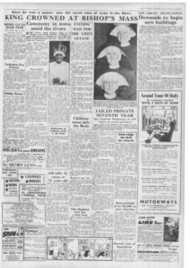Page 4, 7th January 1955
Page 4

Report an error
Noticed an error on this page?If you've noticed an error in this article please click here to report it.
Tags
Share
Related articles
Playing Politics
Christianity And Europe's Future
Catholic Anti-marxist Bastion In Austria Imperilled
A New Pa For Britain?
Christian Democracy Flowers In The Rubble Of The Berlin Wall
CHRISTIAN DEMOCRACY
0 NE of the more unexpected developments of post-war Europe was the emergence of Christian polito cal parties as strong enough in a"number of countries to exert decisive influence in internai affairs and to take a lead in 'shaping the lines of European policy as a whole. When laet week the Italian Chrietian Democratic spokesMen openly rebuked the French Christian Democrats for their opposition to the ratification of the Western European treaties and the rearmament of Christian Democratically ruled Germany, it seemed as though what had once been a great Christian political ides.: was winding up its international affairs.
Certainly the position of the French M.R.P. was utterly incomprehensible to most Christians outside who, whether Catholic or Protestant, had felt that this spiritually-based political force was the true hope of a Continent threatened by Communism.
Ostensibly, the M.R.P. were declaring their rejection of the second best, the present treaties, because they were not the best, E.D.C. and the road to European Federation. But the true explanation of this highly irrealistic attitude was in fact to be found in the personalities of French party politice within which the Freneh Prime Minister had outplayed the Catholic leaders. Hence the attitude of the
was doubly regrettable from the Christian political point of view, It not only as a whole, but the M.R.P. deeply embarrassed the defensive policy of the free world also allowed itself to become a conspicuous victim of the vice of contemporary French politics, putting persons and parties before national and even international interests.
WE in this country do not take kindly to the idea of a " confessional " political party: We much prefer to see spiritual forces working from within entirely secular political parties and. other organisations such as trade unions. But this is because the AngloSaxon democracies have never suffered from the anticlericalism which violently divided the public forces of Continental countries. Outside the small Communist Party there are no channels artificially blocked against Christian or Christian-based spiritual and moral influences, and it is up to Christians themselves to exert if they can and will the infieence within any party or organisation which clecisit ely affects our public these influences notably decline, whether through loss of faith or through foolishness in trying to exert the wrong kind of spiritual pressure, one cannot envisege the utility of a Christian party or a Christian trade union, since, in these circurnsteruses, they %could he ineffective and probably harmful even to the Christian cause.
On the Continent the situation was very different. There, Christ ian influences, though strong in themselves, were artificially prevented from being brought to bear on oliticaI and industrial-social life. It was in part, no doubt, a reaction against Christian political narrowness when it possessed a monopoly Of power.
Between the wars and during the war, the rise of totalitarian parties and the general break up of the old order enabled Christians, both Catholic and Protestant, who advocated what we call a centre line of political and social reform, to stand together in the name of the political and social force we call Christian Democracy. EVEN though we may at the moment deplore its weaknesses, we should be ready to acknowledge its r.!markable achievements and study its future prospects. I LI the vanquished countries, it was surely the only force which could have constructively opposed the threat of Communism and the forces of inner disintegration. If Italy today stands stronger than anyone could have dared hope—and politically rather more stable than France itself—we owe the fact to De Gasperi and his party.
In Germany, ChristianDemocracy had proved a model to the world— even to many Catholics—ia finding the way to link different Communions within the common Christian political influence. Can one imagine anyone but the Catholic Adenauer so rapidly reconstructing a country on the verge of despair ? France, as is not rarely the case with that country of Continued In next Col.
blog comments powered by Disqus









